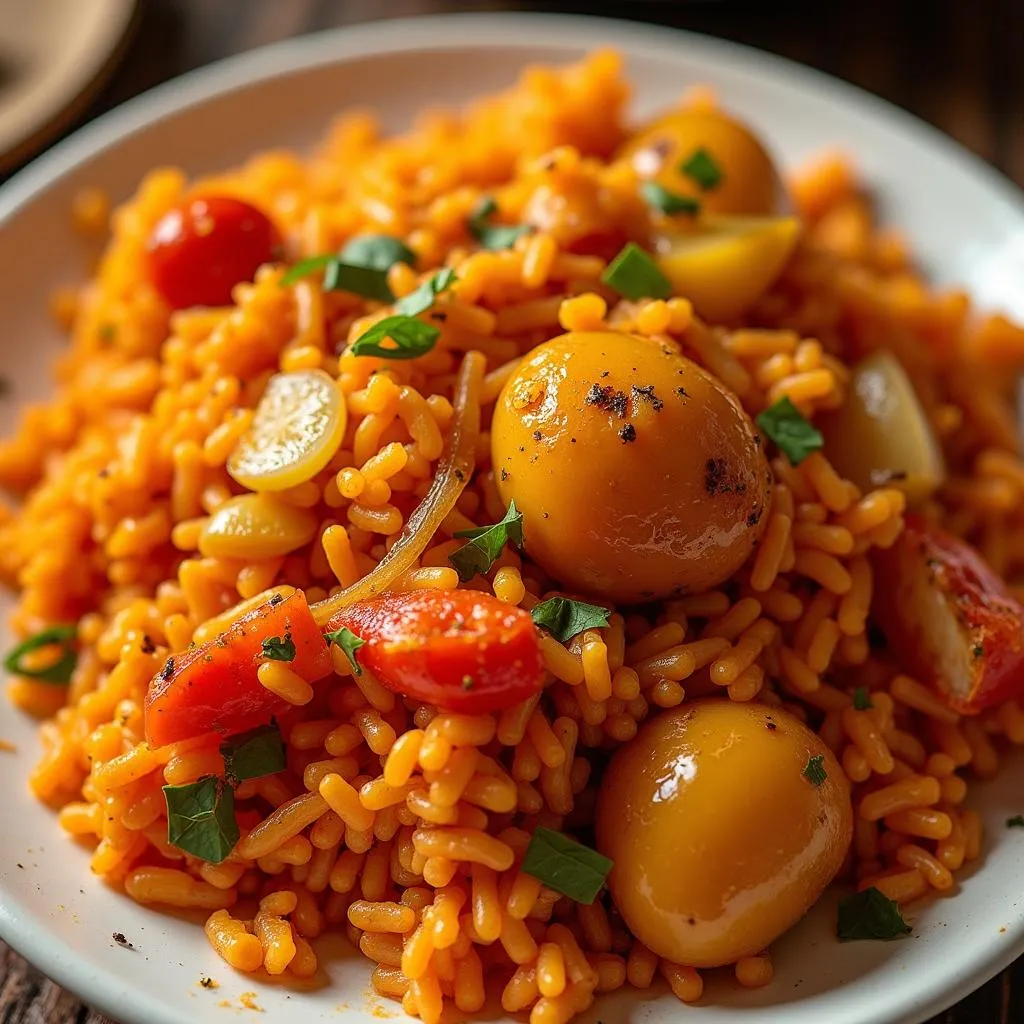Discover Delicious African Dishes Recipes: A Culinary Journey Through the Continent
Africa is a continent rich in vibrant cultures, diverse landscapes, and of course, an array of mouthwatering dishes. The food of Africa is as diverse as its people, reflecting centuries of culinary traditions and influences. This article delves into the fascinating world of African Dishes Recipes, exploring their origins, flavors, and the stories they tell.
Uncovering the Flavorful Secrets of African Cuisine
The food of Africa is a testament to its people’s ingenuity and resilience. From the sun-drenched shores of the Mediterranean to the lush savannas of the interior, each region boasts unique culinary traditions shaped by local ingredients, climate, and cultural influences. The dishes range from hearty stews and flavorful grilled meats to light salads and sweet desserts.
A Taste of Africa: Exploring Popular Dishes
Let’s embark on a culinary journey through some of Africa’s most popular dishes, delving into their ingredients, preparation methods, and the stories they carry:
1. Jollof Rice: A West African Staple
** Jollof Rice, a Popular West African Dish
Jollof Rice, a Popular West African Dish
Jollof rice is a beloved dish in West Africa, a symbol of cultural unity and a favorite at gatherings and celebrations. The dish’s origins are debated, with Senegal, Ghana, and Nigeria all claiming to be its birthplace. However, one thing is certain: Jollof rice is a culinary masterpiece that brings people together.
“Jollof rice is more than just a dish; it’s a cultural icon,” says Chef Aminata Diop, a renowned West African chef. “It’s a dish that brings families and communities together, and its flavor tells a story of shared history and tradition.”
2. Fufu: A Versatile West African Delicacy
Fufu is a staple food in many West African countries, a starchy dough made from pounded cassava, plantains, or yams. It’s often served as a side dish or eaten with stews, soups, or sauces. Fufu is known for its versatility and adaptability, making it a popular choice for everyday meals and special occasions.
3. Nyama Choma: Kenyan Barbecue Delights
Nyama choma, meaning “roasted meat” in Swahili, is a Kenyan favorite. This succulent barbecue dish is made with grilled meat, typically beef, goat, or chicken, seasoned with a blend of spices and herbs. Nyama choma is a popular choice for social gatherings and celebrations, often served with kachumbari, a refreshing tomato and onion salad.
4. Couscous: A North African Culinary Classic
Couscous, a staple in North African cuisine, is made from steamed semolina granules. It’s often served as a side dish or as a base for flavorful stews and tagines. The dish is known for its subtle, nutty flavor and fluffy texture.
“Couscous is more than just a dish; it’s a symbol of our heritage,” says Fatima El-Khatib, a renowned Moroccan chef. “The process of making couscous is an art form, and each grain tells a story of our history and culture.”
5. Biltong: South African Dried Meat Delicacy
Biltong, a South African delicacy, is made from dried and cured meat, typically beef, but also sometimes ostrich, venison, or kudu. It’s a savory, chewy snack or a delicious addition to salads or sandwiches. The traditional method of making biltong involves drying the meat in the sun and seasoning it with salt, pepper, and vinegar.
Exploring the Rich Diversity of African Dishes
This is just a glimpse into the vast and diverse world of African cuisine. The continent boasts a rich tapestry of culinary traditions, each with its unique story to tell.
Embark on Your Own Culinary Adventure
With its vibrant flavors and diverse ingredients, African cuisine is waiting to be explored. So why not try your hand at creating your own African dishes? You’ll be amazed by the delicious results!
FAQ
1. What are some common ingredients used in African dishes?
African dishes typically feature a wide array of fresh ingredients, including vegetables, fruits, herbs, spices, and meats. Common ingredients include tomatoes, onions, peppers, garlic, ginger, turmeric, cumin, coriander, cilantro, okra, cassava, plantains, yams, rice, millet, sorghum, beans, lentils, chicken, beef, goat, lamb, and fish.
2. What are some tips for making authentic African dishes at home?
When preparing African dishes at home, it’s important to use fresh, high-quality ingredients and to pay attention to the seasonings. Be sure to use authentic African spices and herbs, as they play a key role in creating the unique flavors of these dishes.
3. Are there any vegetarian or vegan options in African cuisine?
Yes, there are many vegetarian and vegan options in African cuisine. Stews, soups, salads, and grain-based dishes often feature vegetables, legumes, and spices.
4. What are some popular African desserts?
Some popular African desserts include:
- Mămăligă (Romanian polenta): This simple but hearty dish is made from coarse cornmeal and is a staple in Romanian cuisine. It can be served with butter, cheese, sour cream, or various toppings.
- Gâteau de riz (Rice Cake): This cake is made from rice flour, sugar, butter, and eggs, and is often flavored with vanilla or almond extract.
- Foul medames (Fava Bean Stew): This flavorful stew is made with fava beans, garlic, lemon, and olive oil, and is often served with bread or pita.
5. What are some popular African drinks?
Some popular African drinks include:
- Bissap: A refreshing drink made from hibiscus flowers, known for its vibrant red color and tart flavor.
- Zobo: A popular Nigerian drink made from hibiscus flowers, ginger, cloves, and other spices.
- Ginger beer: A bubbly drink made from ginger root, often served with a hint of lime.
- Palm wine: A fermented drink made from the sap of palm trees, often served fresh or in a more potent form.
Explore more African dishes recipes!
With its diverse flavors and culinary traditions, African cuisine offers a world of possibilities for food lovers. Don’t just take our word for it – explore and discover the delicious world of African food!
